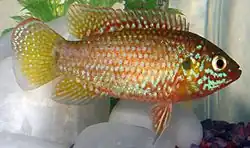African jewelfish
| African jewelfish | |
|---|---|

| |
| Scientific classification | |
| Kingdom: | Animalia |
| Phylum: | Chordata |
| Class: | Actinopterygii |
| Order: | Cichliformes |
| Family: | Cichlidae |
| Genus: | Hemichromis |
| Species: | H. bimaculatus
|
| Binomial name | |
| Hemichromis bimaculatus T. N. Gill, 1862[2]
| |
| Synonyms | |
| |
The African jewelfish (Hemichromis bimaculatus), also known as jewel cichlid or jewelfish, is from the family Cichlidae.
Description
Hemichromis bimaculatus can grow up to 15 cm (6 in) long.[3] H. bimaculatus are red with fine "jewel-like" blue spots and three dark spots on the sides, the first on the opercle, the second in the middle of the body, the third at the base of the tail.[4]
These colorful fishes are popular among fishkeepers, but they are unsuitable for typical community aquariums because of their aggressive territorial behavior, especially when breeding.[3]
Distribution and habitat
The species originates from West Africa (hence its name), with additional reports (possibly other Hemichromis species) from Middle Africa and the Nile Basin.[4] They are found in rivers, streams, and canals, especially in forested regions where vegetation overhangs the water surface.[3][4]
H. bimaculatus, the true African jewelfish, reportedly has been found throughout a large part of Africa, but this is, at least in part, because of taxonomic uncertainty.[4][5] It is certainly found in West Africa, but if it is the same species in Middle Africa and the Nile Basin remains unclear.[4]
The same confusion exists elsewhere, as Hemichromis species have been introduced to regions far from their native Africa. For example, the true African jewelfish, H. bimaculatus, is reportedly the species introduced to the United States, specifically Florida (and spreading), but this involves the related H. letourneuxi.[6] Another relative that has become popular in the aquarium trade is H. lifalili, but it is easily recognized by lacking a dark spot at the base of the tail.[3]
References
- ^ Dankwa, H.; Azeroual, A.; Lalèyè, P. (2020). "Hemichromis bimaculatus". IUCN Red List of Threatened Species. 2020: e.T182628A134775783. doi:10.2305/IUCN.UK.2020-3.RLTS.T182628A134775783.en. Retrieved 20 November 2021.
- ^ ITIS.gov
- ^ a b c d SeriouslyFish: Hemichromis bimaculatus. SeriouslyFish at the Wayback Machine (archived May 28, 2013).
- ^ a b c d e Froese, Rainer; Pauly, Daniel (eds.). "Hemichromis bimaculatus". FishBase. December 2014 version.
- ^ Stiassny, M.L.J.; A. Lamboj; D. De Weirdt; and G.G. Teugels (2007). Cichlidae. p. 269–403 in: M.L.J. Stiassny, G.G Teugels and C.D. Hopkins (eds.) The fresh and brackish water fishes of Lower Guinea, West-Central Africa. Volume 2. Coll. faune et flore tropicales 42. Institut de recherche de développement, Paris, France, Muséum national d'histoire naturelle, Paris, France and Musée royal de l'Afrique Central, Tervuren, Belgium. ISBN 9789074752213.
- ^ Nonindigenous Aquatic Species: Hemichromis letourneuxi . USGS. Retrieved 18 December 2014.
Further reading
- Robins, Richard C., Reeve M. Bailey, Carl E. Bond, James R. Brooker, Ernest A. Lachner, et al. (1980). A List of Common and Scientific Names of Fishes from the United States and Canada, Fourth Edition. American Fisheries Society Special Publication, no. 12. American Fisheries Society .Bethesda, Maryland.
- Riehl, R., and H. A. Baensch. (1989). Aquarium Atlas. Hans A. Baensch. Melle, Germany. ISBN 3-88244-050-3.
- https://web.archive.org/web/20061022135111/http://www.aquariumfish.com/aquariumfish/Breed_Profiles.aspx?aid=6263&cid=3680&search=
- Aqualand Fact Sheets
